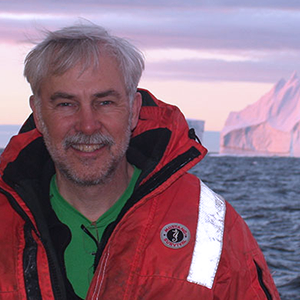Downloads
Research Interests
The Sherrell lab studies the biogeochemistry of trace metals in the modern ocean and uses this understanding to develop new geochemical paleo-records of past ocean conditions. We are helping to increase the general knowledge of the distribution and dynamics of trace metals and isotopes in the ocean through the international GEOTRACES program (geotraces.org), and recently completed GEOTRACES cruises in the tropical South Pacific and in the Arctic Ocean. We are very interested in metals that act as micro-nutrients for phytoplankton, and have active research programs exploring the mechanisms of natural Fe fertilization of ocean productivity in two shelf regions off west Antarctica. In addition, we are developing new geochemical paleo-proxies in tropical and deep-sea corals and are using these to develop histories of nutrients and the carbonate system of the past ocean. Part of this work involves long-term culturing studies with slow-growing deep corals to determine coral skeleton chemistry as a function of tightly controlled seawater chemistry; this work is being carried out in Barcelona. We are also pursuing high-resolution paleo-climate results by determining minor elements and isotopes in an 83,000 year old stalagmite from a cave on the SW Pacific island of Niue, with the goal of reconstructing rainfall at this site and unraveling its relationship to polar and global climate variations. Periodically, we make measurements of iridium and other platinum group metals in sediment sections that cross major extinction events in earth’s history, as part of an effort to determine the role of major extraterrestrial impacts. We are very active in developing analytical techniques using plasma source mass spectrometry, which are applied to all of these research endeavors.
Short History
I got my BA in Chemistry at the small land-locked Oberlin College, got my first job in science working on glucose transport in red blood cells, then got a technician position in Oceanography for 2 years, and got admitted to the MIT-WHOI Joint program in Oceanography. After a postdoc working on ice core chemistry in Greenland, I move to a faculty position at Rutgers, where I have been since 1992.
Teaching Efforts
Undergraduate (includes some courses I will teach in the coming year)
Introduction to Oceanography
Exploration of the Oceans
Environmental Geochemistry
Water Planet
Oceanographic Methods and Data Analysis
Graduate
Chemical Oceanography
Seminar in Marine Isotope Geochemistry
The Antarctic: Ocean, Ice, Climate, Biota
Marine Biogeochemistry

